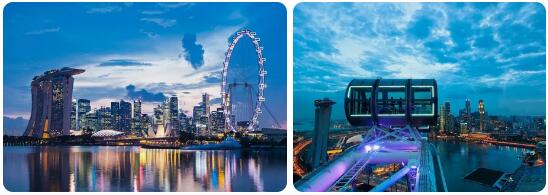Singapore: entry and exit regulations
Formalities, visas
Germans, Austrians and Swiss do not need a visa to enter Singapore.
However, you must have a valid passport.
It is responsible for issuing visas in Germany
Embassy of the Republic of Singapore
Friedrichstr. 200
10117 Berlin
Tel: 0049 – (0) 30 – 226 343-0
Fax: 0049 – (0) 30 – 226 343- 55
Departure fee
In many countries, a fee must be paid when leaving the country. This fee is S $ 15 when leaving Singapore, which is usually already included in the price of the flight ticket.
Import and export of foreign currency
There are no restrictions on the import of foreign currency.
Import and export of goods
The import and export of weapons, ammunition or explosives is strictly prohibited. In addition, the import and export of plants and animals protected under the Washington Species Protection Act is prohibited. Violation can result in severe penalties.
Caution
Drug trafficking is punishable by the death penalty in Singapore. This is also executed. Not least because of this, Singapore is one of the countries with the highest execution rate!
Anyone entering Singapore with medication that requires a prescription in Singapore must prove through a prescription that they are imported for personal use only.
The following goods and quantities are allowed to import:
Anyone who does not enter from Malaysia and stays in Singapore for more than 48 hours is allowed to import
1 liter of hard alcohol, 1 liter of beer, wine or port wine.
Otherwise, if you stay under 24 hours, you may import goods worth under 50 S $, if you stay between 24-48 hours, goods up to 150 S $ and those who stay over 48 hours may import goods up to 300 S $.
Anyone who exceeds the stated quantities must pay 5% VAT.
Current information can be obtained directly from customs.
The Customs Duty Officer Duty Office Terminal 1
Singapore Changi Airport
Singapore.819642
Tel: +65 – 6542.7058 or +65 – 6545.9122
Entry with pets
For the owners of dogs and other animals, when traveling abroad, the question arises whether they can even take their animals with them to the chosen travel destination, and if that is possible, then of course the question of the respective applicable conditions arises. Here with us you will find all the important information on this topic, seriously researched at the embassies, the Foreign Office or the ADAC.
All pets to be imported into Singapore must be quarantined for at least 30 days. This surely makes it unnecessary for the “normal vacationer” to bring pets.
In addition, an official health certificate is required, which confirms that the animal is healthy and free from infectious diseases. This health certificate must not be older than seven days at the time of entry.
Dogs must be vaccinated against distemper, parvovirus and hepatitis upon entry. These vaccinations must be documented in an international vaccination certificate. Dogs also need an electronic chip. Without a chip, import will be refused.
A rabies vaccination of the animals is not absolutely necessary, as the animal can be vaccinated against rabies in the quarantine.
An import permit must be applied for at the AVA (Agrifood and Veterinary Authority) at least two weeks prior to arrival in Singapore.
Pets in the airplane
When transporting pets in airplanes there is the possibility that the animal flies together with an accompanying person (owner) or without such a person.
Transporting animals with an accompanying person (keeper)
In this case, proceed as follows: At the airport, the animal is locked in a transport box provided by the keeper beforehand. It must be ensured that the container is large enough that the animal can stand in it and turn around, and it must also be ensured that no liquids can run out (urine). This is done using suitable absorbent material, in the simplest case using a sufficient amount of newspaper.
There should also be a water bowl and, depending on the length of the flight, enough food. The transport container is handed over to the staff at the check-in counter. The transport fee depends on the weight of the animal. It is essential to ensure that there is space for the animal on the flight booked, as the number of animals that can be transported is limited.
The animal is located in the machine in an air-conditioned area between the passenger deck and the cargo area. As a rule, no member of the crew takes care of the animal during the flight, not even to give water or food.
However, experience has shown that the stress of checking in and the take-off phase is so stressful for most animals that they sleep for most of the flight. The administration of sedatives prior to check-in is not only not recommended, as their effects cannot be foreseen under these conditions, but is even prohibited for reasons of security (smuggling). Many airlines also exclude a number of dogs (attack dogs) from transport.
Animal transport without an accompanying person
In this case, a specialist company must be commissioned with the transport, which then takes care of everything else. However, it should be ensured that the animal is picked up at the arrival airport by someone who is familiar to the dog. And of course all import regulations for pets for the country have to be explored beforehand and strictly adhered to.
Note
It has proven to be very helpful if you have accustomed the animal to such a transport container at home a few weeks before the intended flight.
Singapore: Transport/Getting There
How to get to Singapore
Air connections Singapore’s international airport is an important hub for air traffic from Europe to Asia and Oceania. The flight connections are correspondingly diverse. Almost all major airlines fly to Singapore Changi Airport. The flight from Europe takes about 10 -12 hours. The following airlines fly to Singapore:
- Air France
- Air New Zealand
- Lufthansa
- British Airways
- Qantas
- American Airlines
- Cathy
- China Airlines
- Korean Airlines
- Malysia Airlines
- Northwest Airlines
- Thai Airlines
- Singapure Airlines
- United Airlines
Railroad
- Malaysia-SingaporeSingapore is connected to Malaysia by a good train connection. Current information can be found on the Malay Railroad website: www.ktmb.com.my
- Eastern-Oriental ExpressThe train runs from Singapore via Kuala Lumpur to Bangkok. http://www.orient-express.com
Bus
A well-developed bus network connects Singapore with Malaysia.
Ferry
To get to Indonesia you have to drive across the Riau Archipelago of Indonesia.
Yacht
Anyone thinking of calling at Singapore with a yacht should be aware that the Strait of Malacca is one of the most dangerous waters in the world. Small sailing yachts are not excluded from the piracy that is prevalent here. Again and again, larger cargo ships disappear undetectable in the region!
Travel in the city
Railway
The MTR (Mass Rapid Transit System) is an air-conditioned train that is a modern and efficient local transport system. It also connects the airport to the city center in around 20 minutes. With the Tourist Day Ticket you can use both buses and trains.
Bus
The bus system is an efficient addition to the MTR. With the Tourist Day Ticket, you can use both buses and trains.
Rental car
If you only stay in Singapore, you should not rent a car if possible. The traffic is very hectic and people drive on the left side of the lane. The public transport system works so well that the car is no alternative.
Anyone who does rent a car to drive to Malaysia should keep in mind that the fees for this are high.
To rent a car, you must be at least 21 years old and have a driver’s license that is valid for at least one year and is in English.
Ferry connections
All islands around Singapore can be easily reached by ferry. The system works as smoothly and punctually as the rail system.
Traffic rules
Singapore is known to drive on the left. In order to avoid trouble with the police or even the courts, one should strictly adhere to the traffic regulations in force in the country. The maximum speeds shown can of course be reduced or increased by traffic signs. Regardless of the information given here, it is advisable to obtain detailed information from the ADAC, the AvD or the Singapore Traffic Club.
Maximum speeds
In addition to the general speed limits shown, the speed limits marked by signs must always be strictly observed. Singapore has a speed limit of 60 km/h on urban roads and between 80 and 90 km/h on highways.
Blood
alcohol limits In Singapore there is a permitted blood alcohol limit of 0.8 per mille for drivers of motor vehicles.
International license plate
Singapore’s international license plate is:
| SGP |
Singapore: Travel Medicine, Vaccinations and Warnings
Infectious Diseases
In Singapore, the following infectious diseases, which are not or less common in Germany or Central and Northern Europe, are to be expected:
- Malaria: There is no risk of malaria in the country.
- Dengue fever disease
- Intestinal infections from contaminated food or water, including amoeba, lamblia, salmonella, shigella, worm infestation and all kinds of viruses and bacteria
- Hepatitis A and B
- Polio, polio
- tetanus
- Typhoid – however, there is only a risk of infection for travelers who come into contact with polluted water or contaminated food.
Recommended vaccinations
when traveling to Singapore are recommended vaccinations against the following diseases:
- Diphtheria – a vaccination against diphtheria should always exist, also in the home country.
- Hepatitis A and B
- Polio, polio – vaccination against polio should always exist, also in the home country.
- Tetanus – a vaccination against tetanus should always exist, also in the home country.
- Typhoid – but only for travelers who can come into contact with polluted water or contaminated food.
Compulsory vaccination
For all persons older than one year and arriving from a yellow fever infection area designated by the WHO, there is a compulsory vaccination against a yellow fever disease.
Yellow fever vaccination for children
In most countries where a yellow fever vaccination is compulsory, this also applies to children over one year of age, in some countries even from six months. It should be noted that
a vaccination against yellow fever had a number of side effects, such as encephalitis. Around two-thirds of those affected were children under six months. Therefore, under no circumstances should children under this age be vaccinated. But children under one year of age should also not be vaccinated if possible. If in doubt, yellow fever infection areas must then be avoided.
Any vaccination against yellow fever may only be carried out in specially authorized yellow fever vaccination centers!
Who pays for vaccinations in Germany?
Most children in Germany are vaccinated against a number of infectious diseases at an early age. However, the vaccination protection only lasts up to 10 years, in some cases even shorter. Therefore, before traveling abroad, you should carefully consider against which infectious diseases a vaccination is necessary or useful in the country concerned and whether the vaccination protection, if applicable, was not too long ago.
Most statutory health insurances have been reimbursing the costs for the following vaccinations since June 2007.
There is even no 10 € practice fee – but the insured usually have to pay the statutory co-payment, which is 10% of the vaccine price – that is at least 5 € and a maximum of 10 €. Under these conditions, the following vaccinations are free of charge:
- cholera
- diphtheria
- Early summer meningoencephalitis (TBE)
- Yellow fever
- Hepatitis A and B
- Meningococcal meningitis
- Pneumococci
- Polyo (polio)
- Tetanus (tetanus)
- rabies
- typhus
Some health insurance companies also reimburse the cost of malaria prophylaxis.
As a rule, private health insurance companies (inquire beforehand) also cover the costs mentioned.
Current warnings
Foreign Office of the Federal Republic of Germany
Citizens’ Service
Phone: 0049 – (0) 30 – 5000 – 2000
Fax: 0049 – (0) 30 – 5000 – 51000
www.auswaertiges-amt.de
Singapore: currency, shopping and exchange rate
The national currency of Singapore is the
Singapore dollar (S $) = 100 cents
The following banknotes are valid and in circulation in the country:
- 1
- 2
- 5
- 10
- 20th
- 50
- 100
- 500
- 1,000
The following coins are in circulation:
S $ 0.01, S $ 0.05, S $ 0.20, S $ 0.50, and S $ 1
Exchange rate
You can find a currency converter here:
www3.forium.de
Bank opening hours
Monday – Friday: 9 a.m. or 9:30 a.m. – 5:30 p.m.
Saturday: 9:30 a.m. – 12 p.m.
Shop
Shop opening times
The larger shopping centers are open daily from: 10:00 a.m. to 9:00 p.m.
Smaller shops often close on Sundays or earlier than the above time.
Inexpensive or country-specific goods, souvenirs
In May/June there is the “Great Singapore Sale”, which lasts for eight weeks. During this time you can buy goods up to 80% cheaper.
Singapore: Embassies and Consulates
Representations of Singapore in Germany
The Singapore embassy only moved into the newly constructed building on Vossstrasse in 2011. The new embassy is located a few 100 m from Potsdamer Platz in the Berlin-Mitte district. The planning and implementation of the embassy was in the hands of the Berlin office of the architects Braun & Schlockermann und Partner. The exterior of the message impresses with a light natural stone.
Embassy of the Republic of Singapore in Berlin
Vossstraße 17
10117 Berlin
Tel: 0049 – (0) 30 – 226 343 – 0
Fax: 0049 – (0) 30 – 226 343 – 75
Email: info@singapore-embassy.de
www.singapore-embassy.de
Honorary Consulate General of the Republic of Singapore
Badstrasse 98
71336 Waiblingen
Tel: 0049 – (0) 7151 – 26 30 33
Fax: 0049 – (0) 7151 – 26 11 20
E-Mail: hon.konsulat-singapur.stgt@stihl.de
Honorary Consulate General of the Republic of Singapore
Elisabethstrasse 91
Munich
Tel: 0049 – (0) 89 – 59 08 21 28
Fax: 0049 – (0) 89 – 59 08 12 00
E-Mail: hon.konsulat-singapur.muc@t-online.de
German representations in Singapore
Embassy of the Federal Republic of Germany
12-00 Singapore Land Tower
50 Raffles Place
Singapore 048623
Tel: 0065 – 65 33 60 02
Fax: 0065 – 65 33 11 32
Email: info@singapur.diplo.de
Web: www.singapur.diplo.de
Austrian representations in Singapore
Embassy
The embassy in Indonesia is responsible (see here >>>).
Still responsible:
Austrian Embassy in Singapore
600 North Bridge Road, # 24-04/05 Parkview Square
Singapore 188788
Tel: 0065 – 63 96 63 50
0065 – 63 96 63 51
0065 – 63 96 63 52
Fax: 0065 – 63 96 63 40
E-Mail: embassy.singapore@austriantrade.org
Web: www.austriantrade.org/singapore
Representations of Singapore in Austria
Honorary Consulate General of Singapore in Vienna
Am Stadtpark 9
1030 Vienna
Tel: 0043 – (0) 1 – 71 707
Fax: 0043 – (0) 1 – 71 707
Swiss representation in Singapore
Swiss Embassy in Singapore
1, Swiss Club Link
Singapore 288162
Tel: 0065 – 64 68 57 88
Fax: 0065 – 64 66 82 45
E-Mail: sin.vertretung@eda.admin.ch
Web: www.eda.admin.ch/ singapore
The Swiss embassy in Singapore is still responsible for Brunei.
Representations of Singapore in Switzerland
Consulate of the Republic of Singapore
Avenue du Pailly 10
1219 Châtelaine
Tel: 0041 – (0) 22 – 795 01 01
Fax: 0041 – (0) 22 – 796 83 81
Email: singpm_gva@sgmfa.gov.sg
Web: www.mfa.gov.sg/geneva








